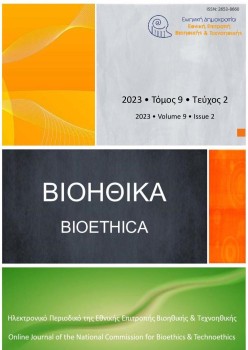The ethical and legal issues of organoid biobanks
Abstract
Organoid technology has been of interest to the academic and scientific community. In particular, the storage of organoids in biobanks has introduced research opportunities in the fields of biomedicine and biotechnology. Whilst biobanks contribute to the scientific investigation of the physiology and function of organoids, they also face challenging ethical and legal issues.
This article aims to analyse the multidimensional ethical and legal issues involved in the operation of organoid biobanks and to propose measures to be considered at varying stages in order to ensure, both ethically and legally, their scientific impact. The issues address informed consent and the privacy of cell donors, the commercialisation of organoids and the possible closure of the biobank. Current guidelines and regulatory frameworks applicable to organoids and biobanks are also addressed.
It is concluded that, despite the considerable ethical and legal challenges raised by the use of organoid biobanks, there is a need to ensure that the biobanks are operational in order to exploit the potential benefits of organoids. To this regard, it is recommended to establish procedures, develop protocols for assurance and quality. From this standpoint, organoid biobanks can contribute to maximising the biomedical and welfare benefits of organoid research as well as contributing to the future regulation of organoid technology.
Article Details
- How to Cite
-
Katsila, M. (2023). The ethical and legal issues of organoid biobanks. Bioethica, 9(2), 36–46. https://doi.org/10.12681/bioeth.35575
- Section
- Reviews

This work is licensed under a Creative Commons Attribution 4.0 International License.
Authors who publish with this journal agree to the following terms:
- Authors retain copyright and grant the journal right of first publication with the work simultaneously licensed under a Creative Commons Attribution CC BY 4.0 License, which allows for immediate free access to the work and permits any user to read, download, copy, distribute, print, search, or link to the full texts of articles, crawl them for indexing, pass them as data to software, or use them for any other lawful purpose. Appropriate credit must be given by citing the author(s) and the original publication in this journal.
- Authors are able to enter into separate, additional contractual arrangements for the non-exclusive distribution of the journal's published version of the work (e.g. post it to an institutional repository or publish it in a book), with an acknowledgement of its initial publication in this journal.
We encourage authors to deposit their articles, as well as data underlying the publications, in institutional and/or other appropriate subject repositories.
Bioethica permits and encourages authors to archive the final publication pdf in institutional (e.g. the repository of the National Hellenic Research Foundation) or other appropriate subject repositories (e.g. SSOAR repository for social sciences), in compliance with institutional and/or funder open access policies, after publication in the BIOETHICA. Authors must provide bibliographic details that credit publication in the journal, as well as related funding details (when applicable).
Lists of institutional and other subject-based academic open access repositories can be found listed by country at the registry http://opendoar.org/countrylist.php
If your institution does not possess a repository you may deposit a copy of your paper at no cost with www.zenodo.org , the repository supported for open access research in the EU by the European Commission, through the project OpenAIRE (www.openaire.eu )



